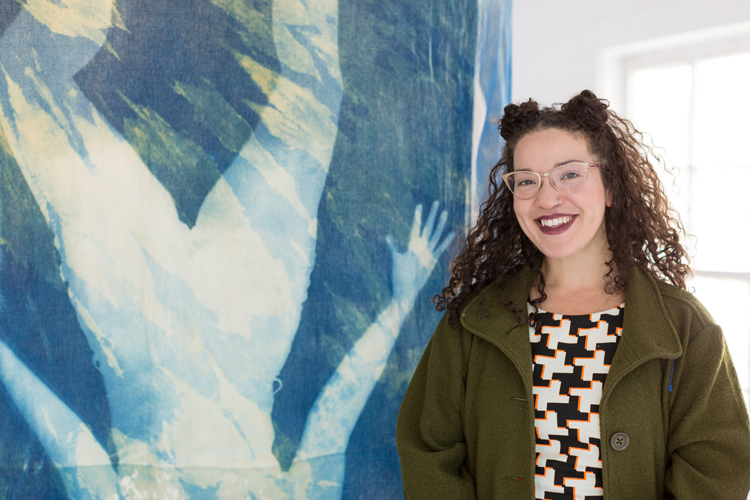
Queer and Revolutionary
Artist Leticia Contreras inspires her audiences to become interconnected agents of change.

As a queer interdisciplinary artist, Leticia Contreras explores both her spirituality and her observations about capitalism’s corrosive effects on human relationships through her art. The proud Afro-Chicana, who uses she/they pronouns, also works to create spaces where people can fully express themselves without judgment and contemplate their impact on the world and people around them.
“Moving through this world as a queer person, I dream of a life of liberation,” she says. “This seeps into the choices I make in my work—both the subjects [I deal with] and the materials I use.”
Contreras’ work is as expansive as her queer and fluid identity, and her passion for art reached new heights in 2012 when she attended Hampshire College, a private liberal-arts school in Amherst, Massachusetts, that allows each student to create a customized curriculum.

Students at the college asked Contreras for her name, pronouns, and used the term “queer” in a non-derogatory manner, which was a first for the Houston native. Her peers, who were mostly students of color and/or working class, also taught her the power of self-organizing for different forms of activism.
Contreras says Hampshire College broadened her understanding of the arts and helped her become the queer and revolutionary creative she is today.
After graduating Hampshire College, Contreras displayed her works at several Houston events such as El Chow: Fruto en Vaina, a group exhibition that showcased local Latinx LGBTQ artists and highlighted their experiences as women and queer people of color. At the show, she presented embroidery looms that featured Spanish and English expressions used by and for lesbians like “tortillera,” a derogatory term said to identify lesbians, “marimacha,” an offensive word used to demean women who present as masculine, “baby dyke,” a young lesbian, and “lipstick femme,” a feminine lesbian.

She also presented her work at Project Row Houses (PRH), a nonprofit organization in Houston’s Third Ward that enriches that community via art. In 2019, as part of PRH’s Round 49: penumbras: sacred geometries exhibition, Contreras created large-scale cyanotypes. She made these blueprints by first soaking natural fiber in chemicals, letting the material dry, and then asking her loved ones to lie on the textiles. After exposing the material to UV rays or direct sunlight, the blue fiber captured her loved ones’ shapes, resembling a print.
She wanted to represent how people in the Gulf Coast region affect the environment around them with her blueprints. The human shapes also gave viewers the chance to consider their relationship with the land, their responsibility to the Earth, and our duty to each other.
“My practice examines how capitalism has impacted our Black and Indigenous communities and commodified our relationship to the Earth, its natural resources, and our relationships to each other,” she says. “Through my work, I try to get my audiences [to realize] that we can be agents of change, and that we have autonomy that is amplified when we recognize our interdependence and interconnectedness with one another and the Earth.”
Contreras is currently a full-time caretaker. Although COVID-19 eliminated three of her jobs as a yoga instructor, a JuiceLand employee, and a photography teacher, the pandemic has also forced her to slow down and reflect on her creative and spiritual practices, which intensified after the George Floyd protests and Pride Month.
“All that national activity made me pick up my camera,” she says. “I wanted to preserve our story because if we are not the ones directing our narratives, someone else will.”

Since the Black Lives Matter protests and Pride Month, Contreras has taken a few dignified portraits of the Black and Brown people in her life. During this unprecedented era, she would like to design a series of unisex shirts featuring quotes from brilliant Black and Indigenous LGBTQ leaders including Audre Lorde, Octavia Butler, James Baldwin, and Winona LaDuke.
However, Contreras has come to realize that her worth as an artist and as a person is not determined by her productivity, so she won’t be upset if these projects never manifest. She views stillness to be as vital as action, and encourages others who feel pressured to create during the pandemic to consider slowing down as well.
“If we give ourselves time to individually and collectively dream, the energy will go in that direction,” she says. “Our dreams can lead to defunding the police and redistributing that wealth toward reparations, or to our trans brothers and sisters. We have to think of the possibilities in order for them to exist.”
Keep up with Leticia Contreras on Instagram @laletty.mala.
This article appears in the September edition of OutSmart magazine.











Comments